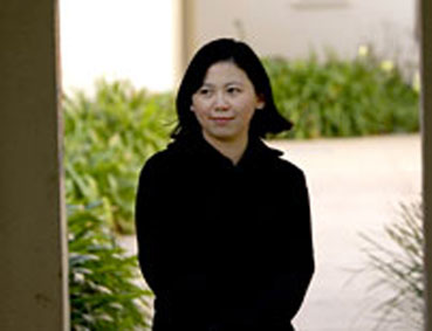A Tale of Two Cities
By Yiyun Li
We have commissioned a new piece of writing from fifty leading authors on the theme of 'Elsewhere' - read on for Yiyun Li's contribution.
In a certain city in Florida, in the bars, there are young women sitting on high stools, and if an older man is interested in one of them, he asks the bartender to send over a cigar, and, accepting the cigar, the chosen woman also accepts drinks and a few hours of companionship.
Bolun could not remember who had told him this. He himself had not set foot in that country. In the restaurant or the karaoke bar or the spa or wherever he had heard the story, the men and women in Florida sounded as though they lived in an old-fashioned fairy tale, innocent in their roguishness and mischief.
Once in a while Bolun imagined himself the man in that fairy tale, taking his time caressing every young woman’s face with his eyes. At the end of the night he might, or might not, make a move—the young women had their whole lives ahead of them. To match their patience and confidence, he too needed to be an unhurried person.
But that calmness he could only have in his imagination. The young women in the places he frequented with his business connections—misses they were called—were uniformly well-trained, and they left little space for his fairy tale. They always seemed to know what he needed; sometimes they had much more to offer than he was willing to accept.
His own wife, whom he had married twenty-seven years ago but had known all his life—their cribs had been next to each other when they had started the Little Sunflower Nursery—he no longer loved. She was not in a position to protest about that, as he had set up her boutique shop specializing in high-end stationery imported from Japan, and he had shown magnanimity when he had discovered her affair with her chauffeur. Sometimes she said that it was not healthy for a man at his age to be out drinking every night, masking, with wifely concerns, her unhappiness with the marriage. He had no other choice, he replied, sparing her his belief that he maintained his lifestyle so that their daughter, for whom he had secured a job of writing restaurant reviews for a leading fashion magazine in Beijing, would not have to make a living like the young women he patronized.
“Only a man who understands love can come up with this genius idea.” Such were the compliments paid to Bolun by his subordinates when, to advertize a new development he and his partner had built on the southern end of the sprawling metropolis, he proposed a carousel riding contest. One lucky couple—they had to be young and struggling to find a place to live in Beijing—who could beat all rivals to ride for the longest time on a carousel would take home, or rather would make a home of, a two-bedroom apartment.
Anything he proposed would be called a genius idea, Bolun knew, but this time he did love his own proposal. Very soon the contest and its logo, “Love and Persistence Win” were printed in major newspapers. He imagined the clichés, which he especially loved: the maudlin love songs from the loudspeakers, the colorful lights lit up at night, the ups and downs of the young contestants, each couple sharing a wooden horse or a camel and burying whatever differences or disagreements they had in their relationship for the dream of having an unaffordable apartment. Bolun himself had worked all sorts of low jobs at their age. Not in every dynasty, or every country, could a man have made it as he had done, but of this he knew not to brag, as he had done nothing special. He was born at the right time and in the right place, and had recognized and acted upon a certain vague call to wealth when it was barely noticeable to most people. Take that, sometimes when he was drunk he thought of the men in the Floridian bar; now whose fairy tale was better written?
The contest began on the seventh day of the seventh month of the lunar calendar—a day associated with a love story from folklore, which had been recently revived for commercial reasons and was called the Chinese Valentine’s Day. Before the first spin of the carousels there had been much publicity generated: the amusement park which hosted the contest had installed new carousels in addition to the five they had already; hundreds of young couples camped overnight in line to register for the contest; the eruptions of arguments and shedding of tears by those whom the amusement park could not accommodate were reported in the newspapers. All went as planned.
Among the excitement and chaos, one girl’s story caught Bolun’s attention. A recent graduate from university and a new arrival in the city, she broke up with her boyfriend of three years when he had refused to make himself “a clown to amuse some rich men’s nonsense”, as the newspaper quoted him. She advertized on her blog for a new boyfriend with the stamina and determination to win an apartment with her, and even that became a contest of itself: her well-publicized first dates with her candidates fanned the PR fire for the contest.
Bolun wanted the young woman to win. She was not the prettiest, and the boy she had chosen was not the most handsome, but Bolun loved her face, where youthful dreams had died before their time and signs of suffering from a life she was too young to understand had not yet set in. He could have given her, through the PR company, a small amount of money for more presentable clothes in front of the TV crews and photographers, but that, on his part, would be a pre-emptive move of impatience.
The contest, in the end, was one of those fairy tales that went slightly wrong. For days, the carousels spun from morning till midnight, with three ten-minute breaks built in for the contestants to rest; every day more couples dropped out with paled faces but there were the persistent ones, who had to be peeled off the wooden animals with a guarantee they could resume the next day. On the seventh day, it was apparent that the eight couples left would only drop out when death interfered. The company quoted health and humanitarian concerns to end the contest without deciding a winner. It had gathered enough coverage, in any case, and each of the eight couples would get a check for twenty thousand yuan as their prize—a decent move on the company’s part, as the combined total was the price of an apartment on their list.
Bolun often thought about the girl who had not won the apartment—sometimes as a father, though a father would be more heartbroken than he himself felt; sometimes as an older man would have thought of the young women on their high stools. Had they been living in one of those old-fashioned fairy tales, he would have seen to it that a cigar, a drink, a small offering be passed to her, but they were not in Florida, where palm trees clamored with their long, finger-like leaves; they were in a city called Beijing where, as a young man, he had planted young trees that later, as a real estate developer, he had ordered to be removed.
Copyright © 2010, Yiyun Li. All rights reserved.
Supported through the Scottish Government’s Edinburgh Festivals Expo Fund.




 Major new partnership with Celtic Connections
Major new partnership with Celtic Connections 

